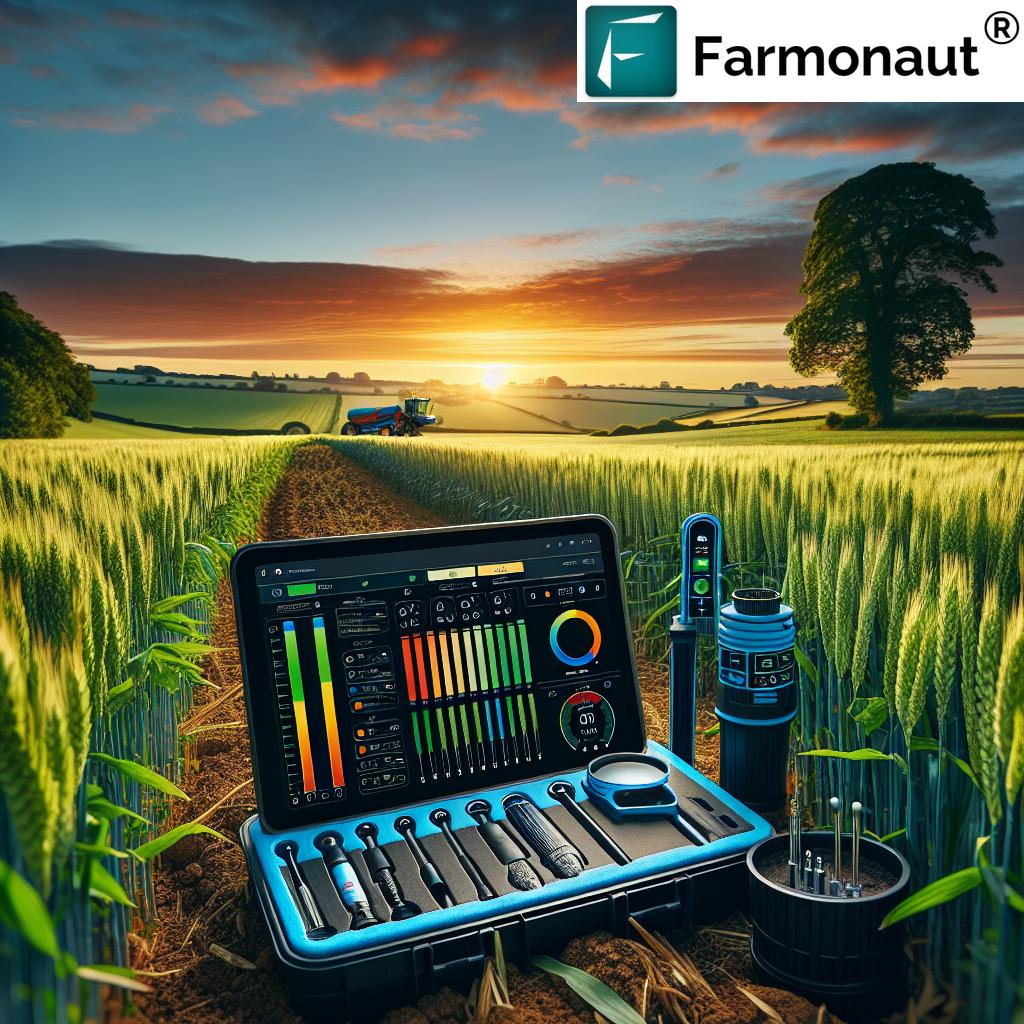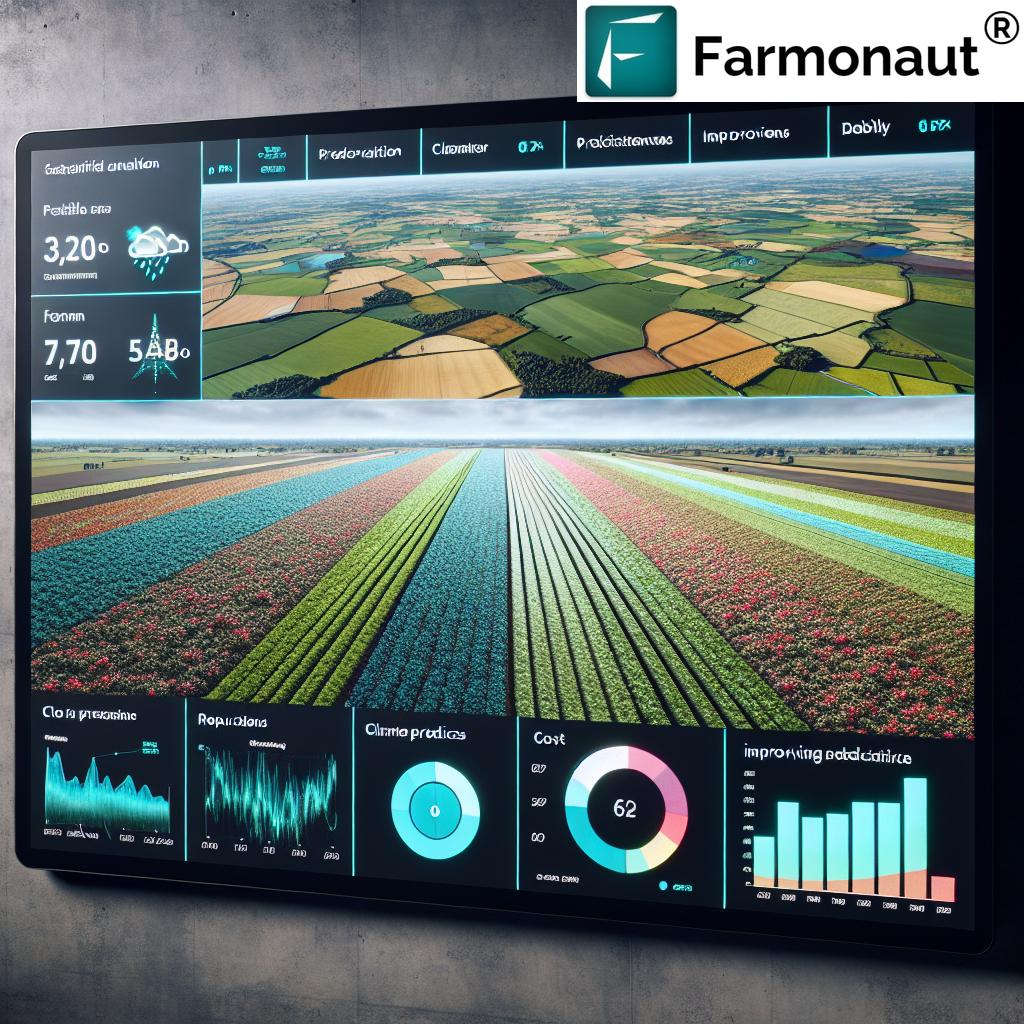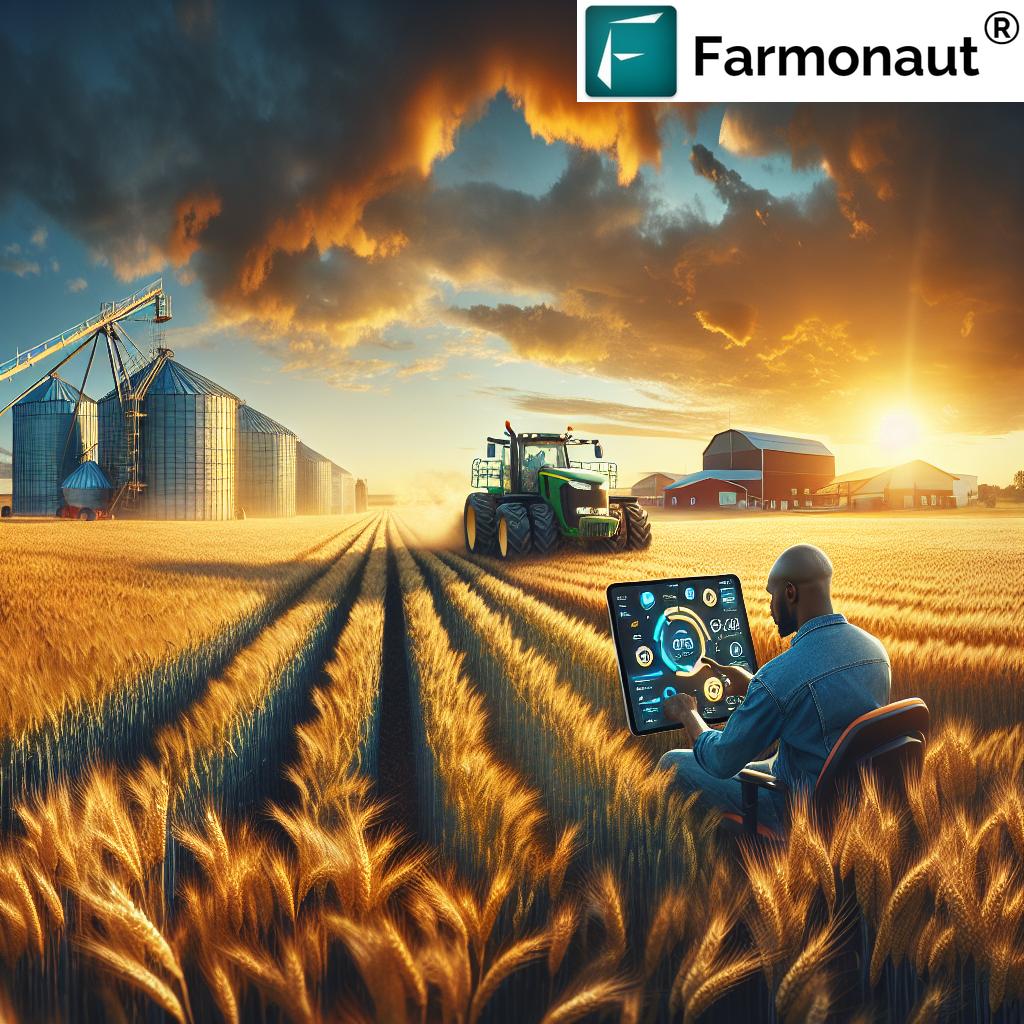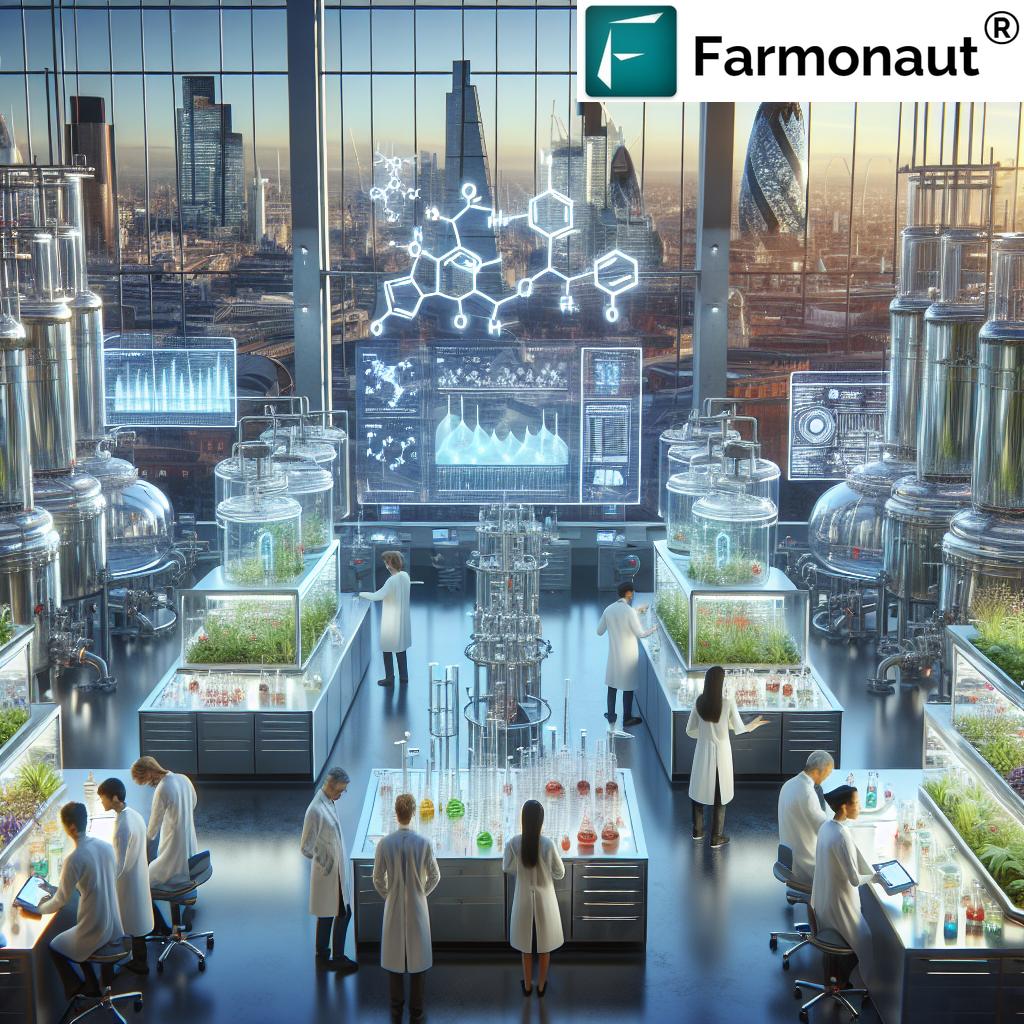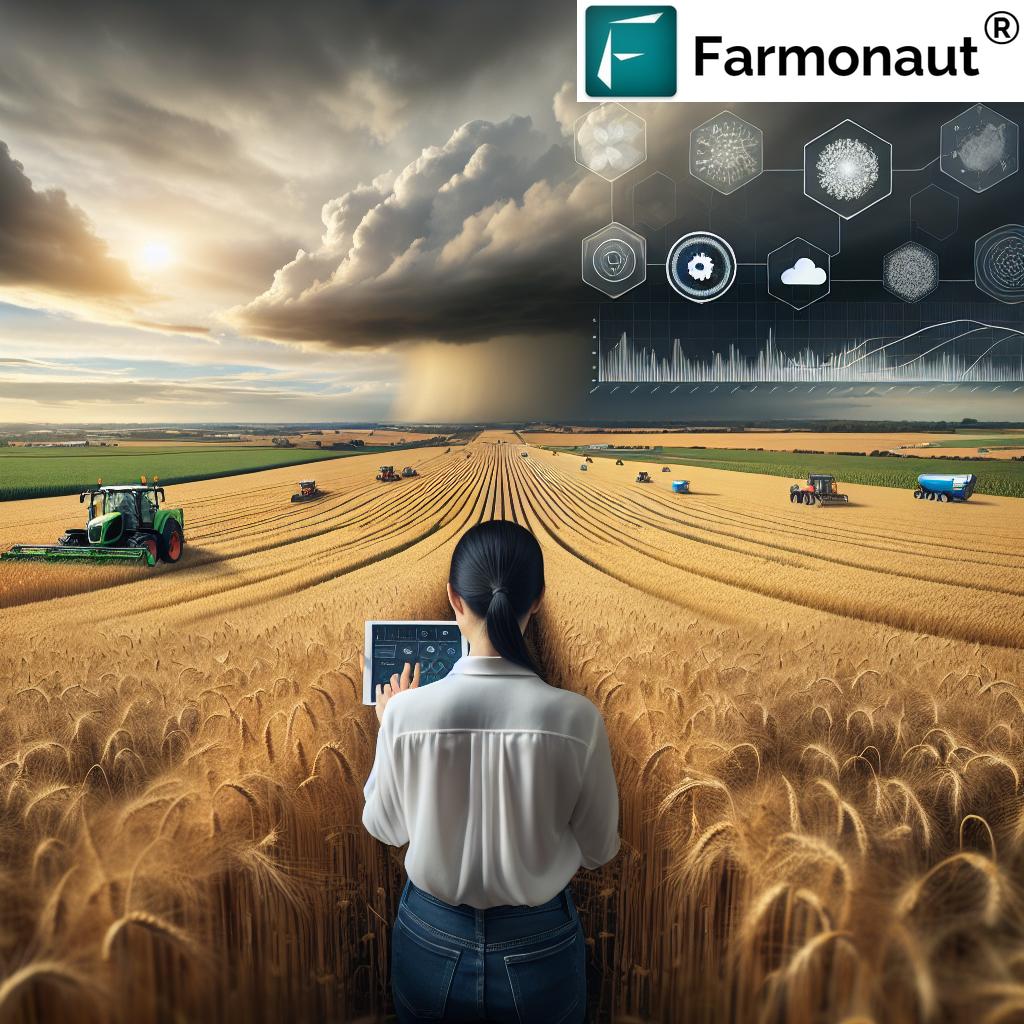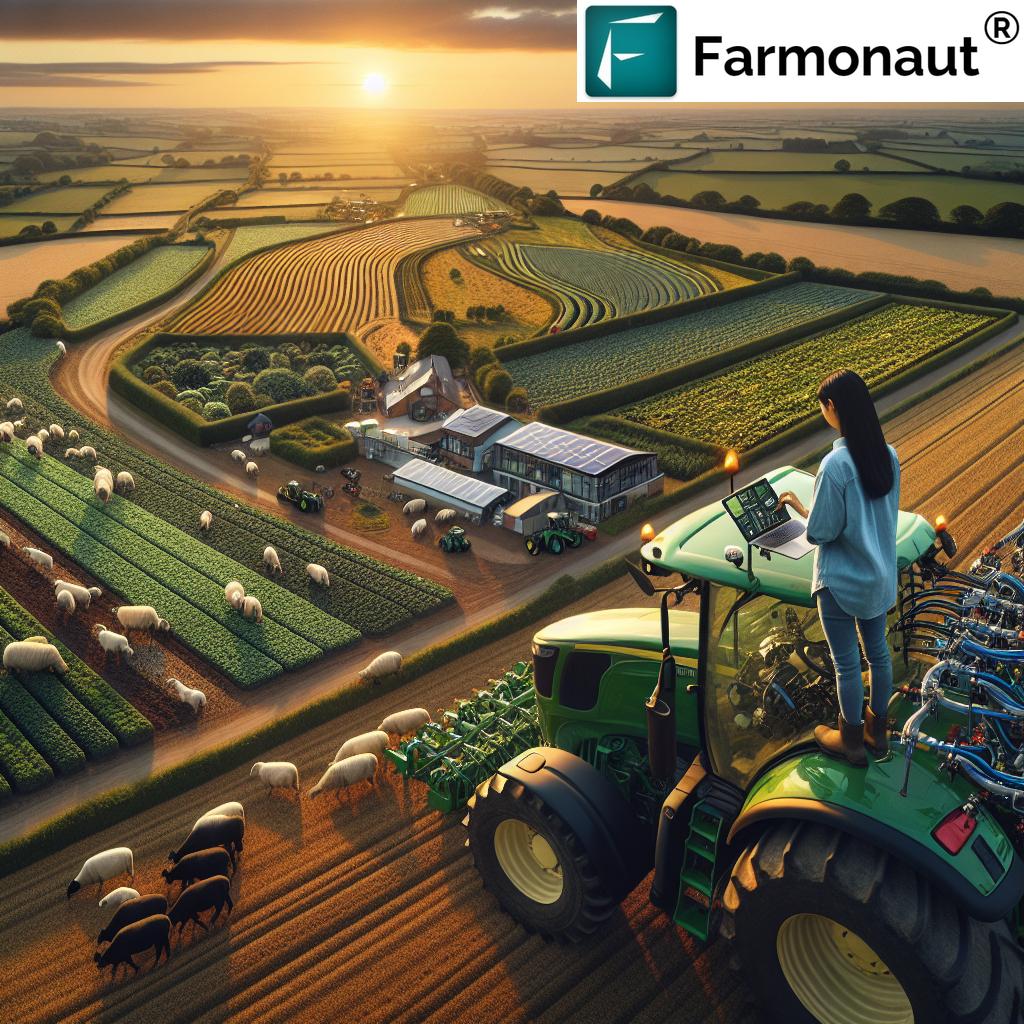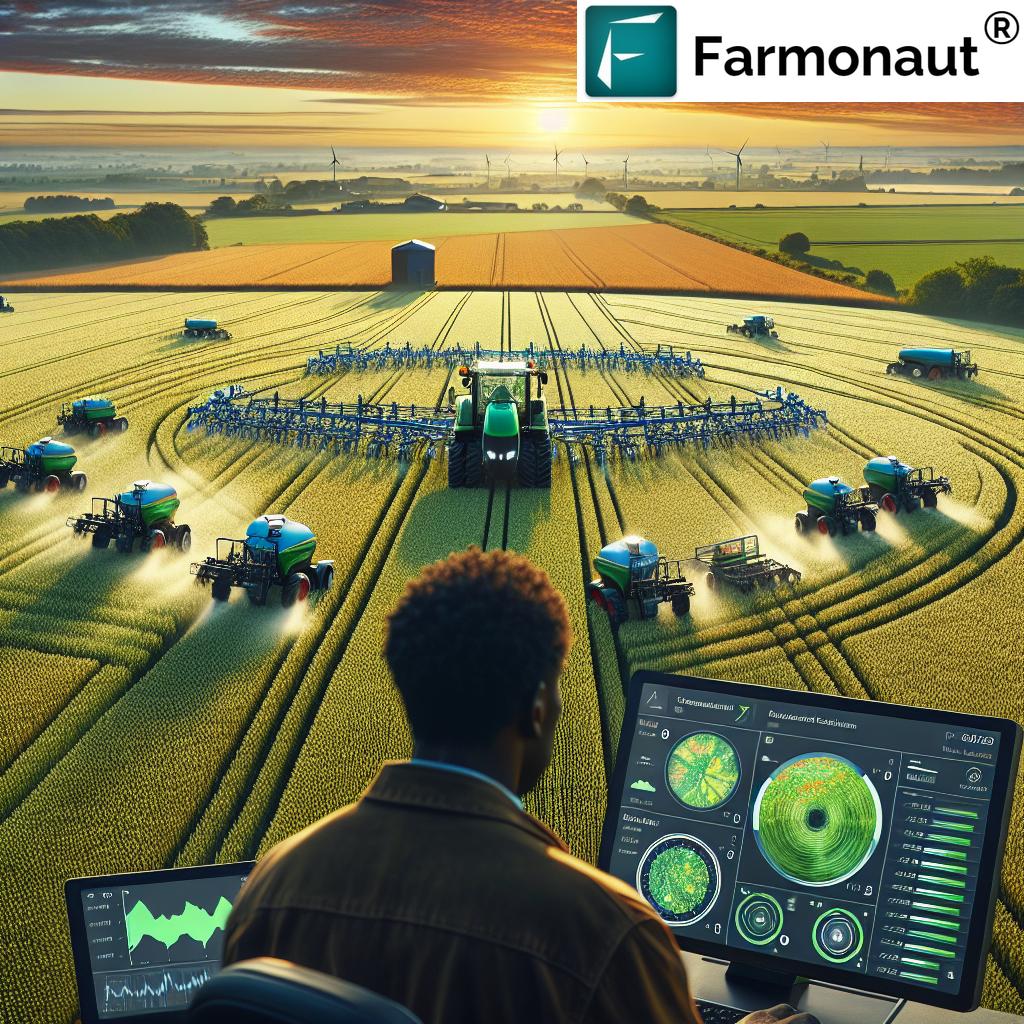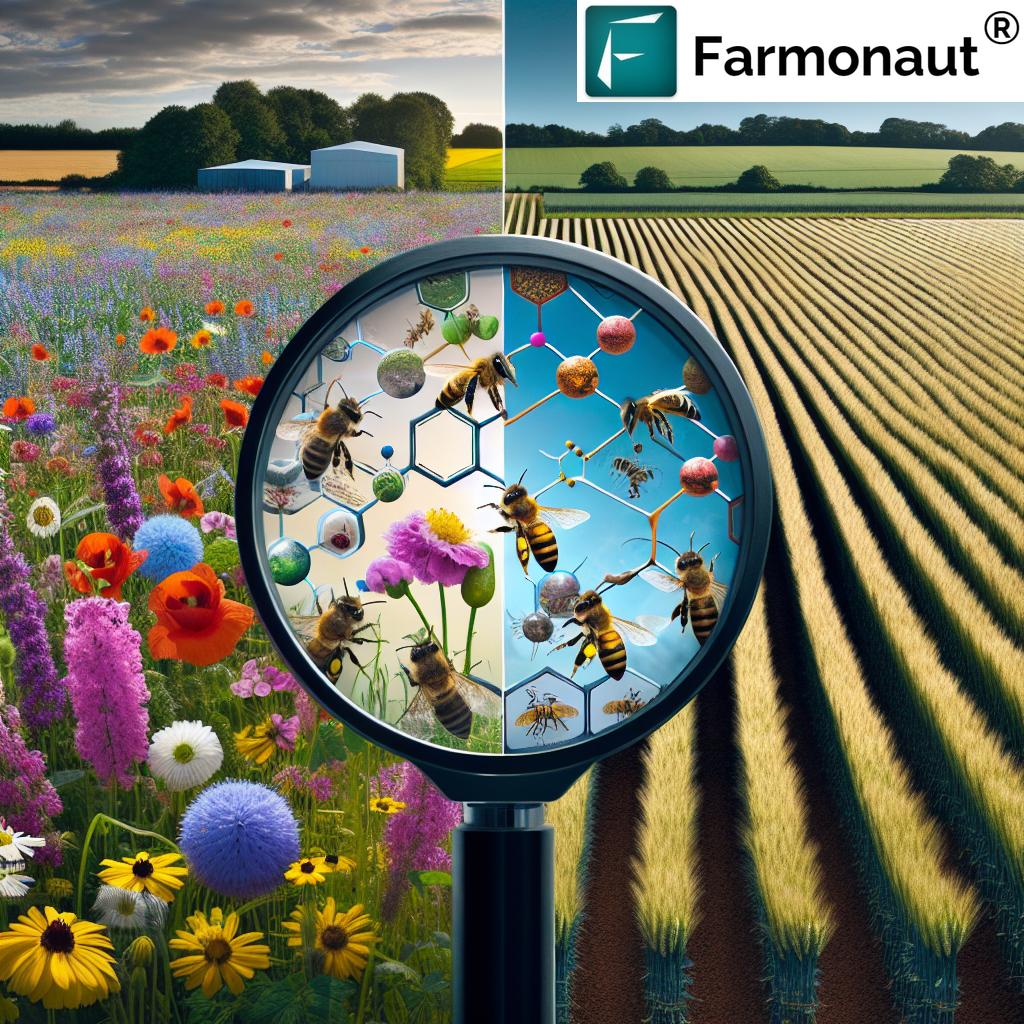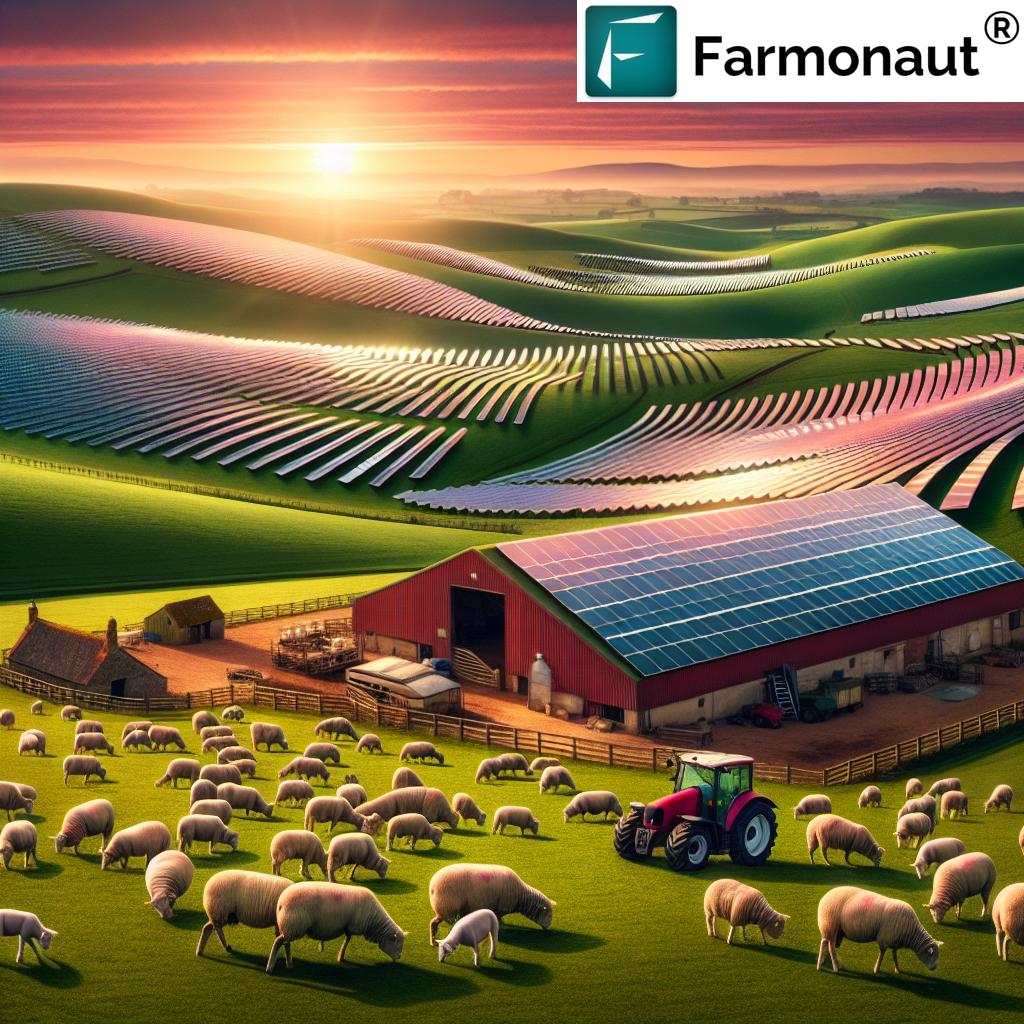Revolutionizing UK Farming: How Precision Agriculture Technology is Transforming Lincolnshire’s Agricultural Landscape
“Precision agriculture technology is transforming farms across at least 10 UK counties, including Shropshire, Essex, and Yorkshire.”
Welcome to our comprehensive exploration of how precision agriculture technology is reshaping the farming landscape across the United Kingdom. From the rolling hills of Shropshire to the fertile plains of Lincolnshire, we’re witnessing a revolution in agricultural practices that’s changing the face of British farming. In this blog post, we’ll delve into the innovative smart farming solutions that are transforming operations in counties like Yorkshire, Devon, and beyond.
As we journey through the UK’s agricultural heartlands, we’ll uncover how farmers are leveraging cutting-edge technologies such as agricultural drones, IoT devices, and advanced crop monitoring systems to optimize their operations. We’ll explore the impact of these innovations on various sectors, including dairy, poultry, and arable farming, and how they’re contributing to more sustainable and efficient agricultural practices.
Join us as we examine the latest agritech innovations boosting productivity across the United Kingdom, from Cumbria in the north to Kent in the south. We’ll provide valuable insights into how digital agriculture tools are empowering farmers to make data-driven decisions, revolutionizing farm management in counties like Herefordshire and Norfolk.
Whether you’re a farmer in Cornwall looking to adopt new technologies or an agricultural enthusiast in Essex curious about the future of farming, this guide to farm data analytics and smart farming technologies will equip you with essential knowledge for modern agriculture in the UK.
The Rise of Precision Agriculture in the UK
Precision agriculture technology has been gaining significant traction across the United Kingdom in recent years. This innovative approach to farming combines data analytics, satellite imagery, and IoT devices to optimize every aspect of agricultural operations. Let’s explore how various UK counties are embracing these technologies:
- Lincolnshire: Known as the breadbasket of England, Lincolnshire has been at the forefront of adopting precision agriculture technologies. Farmers in this county are using advanced farm management software to monitor crop health and make informed decisions about irrigation and fertilizer application.
- Yorkshire: In Yorkshire, agricultural drones have become increasingly popular for surveying large areas of farmland quickly and efficiently. These drones provide high-resolution imagery that helps farmers identify potential issues before they become significant problems.
- Devon and Cornwall: These southwestern counties are leveraging IoT devices to monitor soil moisture levels and weather conditions, enabling farmers to optimize water usage and reduce waste.
The adoption of these technologies is not limited to these regions. Farmers in Shropshire, Essex, and other counties across the UK are also embracing precision agriculture to improve their operations and boost productivity.
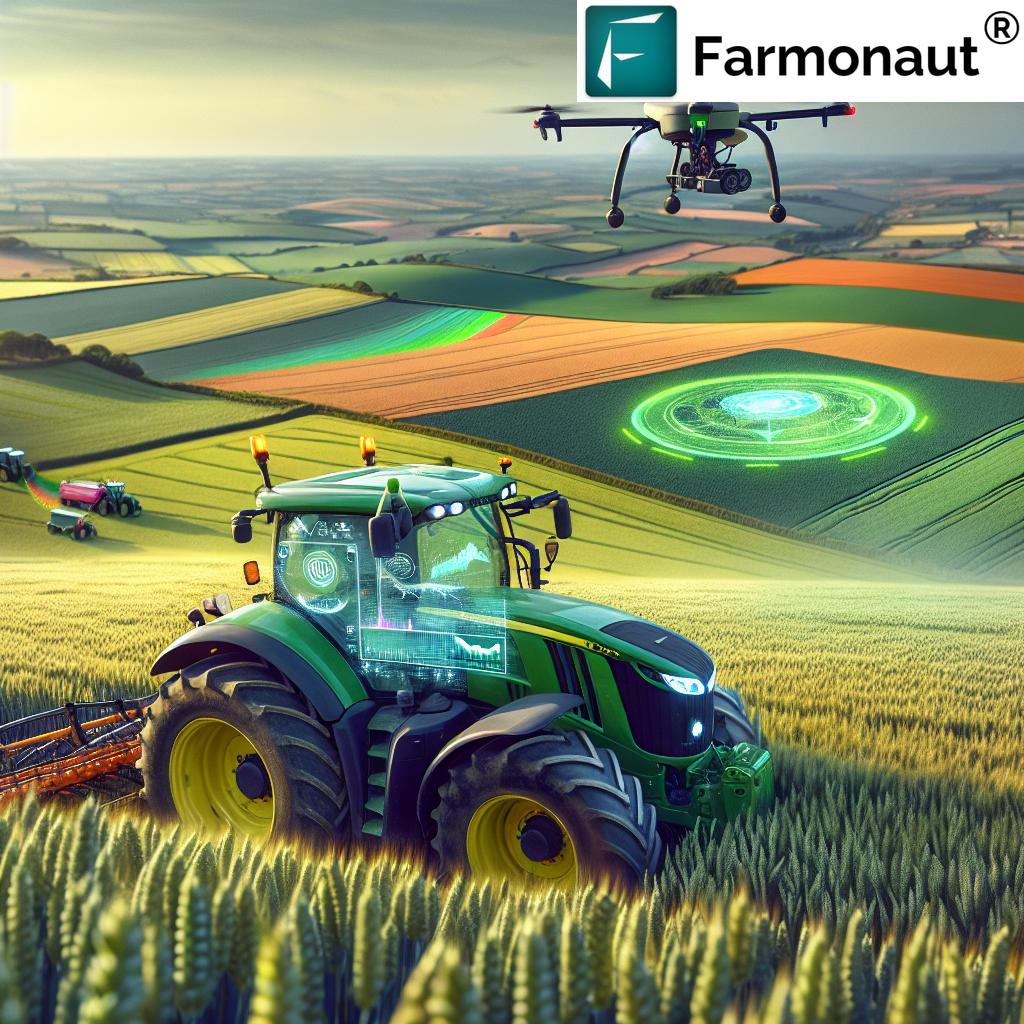
Smart Farming Solutions Transforming UK Agriculture
Smart farming solutions are revolutionizing agricultural practices across the United Kingdom. These innovative technologies are helping farmers optimize their operations, reduce costs, and increase yields. Let’s explore some of the key solutions that are making a significant impact:
- Farm Management Software: Advanced software platforms are enabling farmers to manage their operations more efficiently. These tools provide real-time data on crop health, weather conditions, and resource usage, allowing for more informed decision-making.
- Crop Monitoring Systems: Sophisticated sensors and imaging technologies are being used to monitor crop health and growth patterns. This data helps farmers identify potential issues early and take proactive measures to protect their crops.
- Agricultural Drones: Drones equipped with high-resolution cameras and multispectral sensors are being used for aerial surveys of farmland. These devices provide valuable data on crop health, pest infestations, and irrigation needs.
- IoT in Agriculture: Internet of Things (IoT) devices are being deployed across farms to collect data on various parameters such as soil moisture, temperature, and humidity. This information helps farmers optimize resource usage and improve crop yields.
These smart farming solutions are not only improving productivity but also contributing to more sustainable farming practices across the UK.
Precision Agriculture in Action: A Look at Lincolnshire
Lincolnshire, with its vast expanses of arable land, has been a pioneer in adopting precision agriculture technologies. Let’s take a closer look at how farmers in this county are leveraging these innovations:
- Satellite-Based Crop Monitoring: Farmers in Lincolnshire are using satellite imagery to monitor crop health across large areas. This technology allows them to identify variations in crop growth and take targeted action where needed.
- Variable Rate Technology: Advanced machinery equipped with GPS and variable rate technology is being used to apply fertilizers and pesticides more precisely. This not only reduces input costs but also minimizes environmental impact.
- Soil Mapping: Detailed soil mapping techniques are helping farmers in Lincolnshire understand the variations in soil composition across their fields. This information is crucial for optimizing crop rotation and nutrient management strategies.
The adoption of these technologies has led to significant improvements in crop yields and resource efficiency in Lincolnshire, setting an example for other agricultural regions across the UK.
Sustainable Farming Practices in Devon and Cornwall
The southwestern counties of Devon and Cornwall are leading the way in sustainable farming practices, leveraging precision agriculture technologies to reduce environmental impact while maintaining productivity. Here’s how farmers in these regions are embracing sustainable agriculture:
- Precision Irrigation: Smart irrigation systems are being used to optimize water usage based on real-time soil moisture data and weather forecasts. This helps conserve water resources while ensuring optimal crop growth.
- Integrated Pest Management: Farmers are using data from crop monitoring systems to implement targeted pest control strategies, reducing the need for broad-spectrum pesticides.
- Renewable Energy Integration: Many farms in Devon and Cornwall are incorporating solar panels and wind turbines to power their operations, reducing reliance on fossil fuels.
These sustainable farming practices are not only benefiting the environment but also improving the long-term viability of agricultural operations in the region.
“Smart farming solutions in the UK are impacting multiple sectors, including dairy, poultry, and arable farming.”
Agritech Innovations Boosting Productivity in Various Sectors
The impact of precision agriculture technology extends beyond arable farming, revolutionizing various agricultural sectors across the UK. Let’s explore how agritech innovations are boosting productivity in different areas:
- Dairy Farming: In counties like Cheshire and Somerset, dairy farmers are using IoT devices to monitor cow health and milk production. Automated milking systems and real-time health monitoring are improving efficiency and animal welfare.
- Poultry Farming: Farmers in Herefordshire and Norfolk are leveraging smart climate control systems and automated feeding technologies to optimize poultry production. These innovations are leading to improved bird health and increased egg production.
- Livestock Management: In Cumbria and Yorkshire, livestock farmers are using GPS tracking and health monitoring devices to manage their herds more effectively. This technology helps in early disease detection and optimizing grazing patterns.
These sector-specific innovations demonstrate the versatility and wide-ranging impact of precision agriculture technologies across the UK farming landscape.

Digital Agriculture Tools Empowering UK Farmers
Digital agriculture tools are playing a crucial role in empowering farmers across the United Kingdom to make data-driven decisions. These tools are transforming traditional farming practices and enabling more efficient and productive operations. Let’s explore some of the key digital agriculture tools being adopted by UK farmers:
- Farm Data Analytics Platforms: Advanced analytics platforms are helping farmers in counties like Kent and Norfolk to process and interpret vast amounts of data collected from various sources. These insights are crucial for optimizing crop management strategies and improving overall farm performance.
- Mobile Farm Management Apps: Farmers in Warwickshire and Worcestershire are using mobile apps to access real-time information about their farms from anywhere. These apps provide updates on weather conditions, crop health, and equipment status, enabling quick decision-making.
- Precision Planting Systems: In arable farming regions like Lincolnshire and Essex, precision planting systems are being used to optimize seed placement and spacing. This technology ensures optimal use of resources and improves crop yields.
- Automated Machinery: Self-driving tractors and automated harvesting equipment are becoming increasingly common in counties like Yorkshire and Shropshire. These machines use GPS technology to operate with high precision, reducing labor costs and improving efficiency.
The adoption of these digital agriculture tools is helping UK farmers stay competitive in an increasingly challenging global market.
The Role of IoT in UK Agriculture
The Internet of Things (IoT) is playing an increasingly important role in UK agriculture, connecting various devices and sensors to provide farmers with real-time data and insights. Here’s how IoT is transforming farming practices across the country:
- Soil Monitoring: IoT sensors embedded in the soil are providing farmers in counties like Suffolk and Cambridgeshire with real-time data on soil moisture, temperature, and nutrient levels. This information helps optimize irrigation and fertilization practices.
- Livestock Tracking: In regions like Cumbria and Devon, IoT-enabled tags are being used to track livestock movements and monitor animal health. This technology helps in early detection of diseases and improves overall herd management.
- Weather Stations: Smart weather stations equipped with IoT sensors are providing hyperlocal weather data to farmers across the UK. This precise information helps in planning various farm activities and mitigating weather-related risks.
- Equipment Monitoring: IoT devices are being used to monitor farm equipment performance and predict maintenance needs. This predictive maintenance approach helps reduce downtime and extend the lifespan of expensive machinery.
The integration of IoT in agriculture is not only improving efficiency but also contributing to more sustainable farming practices across the United Kingdom.
Precision Agriculture Technology Adoption in UK Counties
To better understand the adoption of precision agriculture technologies across different UK counties, let’s take a look at the following table:
| County | Agricultural Drones | IoT Devices | Farm Management Software | Overall Adoption Rate |
|---|---|---|---|---|
| Lincolnshire | 65% | 70% | 80% | 72% |
| Yorkshire | 60% | 65% | 75% | 67% |
| Devon | 55% | 75% | 70% | 67% |
| Essex | 58% | 62% | 72% | 64% |
| Shropshire | 52% | 60% | 68% | 60% |
This table provides a snapshot of how different precision agriculture technologies are being adopted across key agricultural counties in the UK. It’s clear that Lincolnshire is leading the way in overall adoption, particularly in the use of farm management software. However, other counties are not far behind, with Devon showing strong adoption of IoT devices and Yorkshire making significant strides in the use of agricultural drones.
The Future of UK Farming: Challenges and Opportunities
As we look to the future of farming in the United Kingdom, it’s clear that precision agriculture technology will play an increasingly important role. However, this transformation also brings its own set of challenges and opportunities. Let’s explore some of these:
Challenges:
- Initial Investment Costs: The high upfront costs of implementing precision agriculture technologies can be a barrier for some farmers, particularly smaller operations.
- Digital Skills Gap: There’s a need for farmers and agricultural workers to develop new skills to effectively use and interpret data from these advanced technologies.
- Data Privacy and Security: As farming becomes more data-driven, ensuring the security and privacy of farm data becomes increasingly important.
- Rural Connectivity: Many rural areas in the UK still lack reliable high-speed internet, which is crucial for the effective implementation of IoT and other smart farming technologies.
Opportunities:
- Increased Productivity: Precision agriculture has the potential to significantly increase crop yields and overall farm productivity.
- Environmental Sustainability: These technologies can help reduce the environmental impact of farming by optimizing resource use and minimizing waste.
- New Revenue Streams: Data collected through precision agriculture could potentially be monetized, providing additional income for farmers.
- Attracting Young Farmers: The integration of technology in farming could help attract younger generations to agriculture, addressing the aging farmer population issue in the UK.
By addressing these challenges and capitalizing on the opportunities, the UK farming sector can position itself at the forefront of global agricultural innovation.
The Role of Government and Industry in Supporting Precision Agriculture
The successful implementation of precision agriculture technologies across the UK requires support from both government and industry. Here’s how various stakeholders are contributing to this agricultural revolution:
Government Initiatives:
- Funding Programs: The UK government has introduced several funding schemes to support farmers in adopting new technologies. For example, the Farming Investment Fund provides grants for equipment and technology that improve farm productivity.
- Research and Development: Government-funded research institutions are working on developing new precision agriculture technologies tailored to UK farming conditions.
- Policy Support: The government is developing policies that encourage the adoption of sustainable farming practices, many of which are enabled by precision agriculture technologies.
Industry Contributions:
- Technology Development: Agricultural technology companies are continuously innovating to create more efficient and user-friendly precision farming tools.
- Training and Support: Many agritech companies offer training programs and ongoing support to help farmers effectively implement and use their technologies.
- Partnerships: Collaborations between technology companies, agricultural suppliers, and farmers are driving the development of integrated precision farming solutions.
The combined efforts of government and industry are crucial in overcoming the challenges and realizing the full potential of precision agriculture in the UK.
Case Study: Farmonaut’s Impact on UK Farming
Farmonaut, a pioneering agricultural technology company, is making significant contributions to the precision agriculture revolution in the UK. By offering advanced, satellite-based farm management solutions, Farmonaut is helping farmers across the country optimize their operations and improve productivity. Here’s how Farmonaut’s technologies are benefiting UK farmers:
- Satellite-Based Crop Health Monitoring: Farmonaut’s platform uses multispectral satellite images to provide farmers with real-time insights into crop health, soil moisture levels, and other critical metrics. This data helps farmers in counties like Lincolnshire and Yorkshire make informed decisions about irrigation, fertilizer usage, and pest management.
- AI-Driven Advisory System: The Jeevn AI advisory system delivers personalized farm advice, weather forecasts, and expert crop management strategies to farmers across the UK. This AI-driven tool analyzes satellite data and other inputs to generate customized recommendations, helping farmers improve their decision-making processes.
- Blockchain-Based Traceability: Farmonaut’s blockchain technology enables product traceability, which is particularly valuable for UK farmers looking to enhance transparency in their supply chains and build consumer trust.
- Fleet and Resource Management: For larger agricultural operations in counties like Essex and Shropshire, Farmonaut’s fleet management tools help optimize logistics and reduce operational costs.
- Carbon Footprint Tracking: As sustainability becomes increasingly important in UK agriculture, Farmonaut’s carbon footprint tracking feature helps farmers monitor and reduce their environmental impact.
Farmonaut’s comprehensive suite of tools is empowering UK farmers to embrace precision agriculture and stay competitive in an evolving agricultural landscape.
The Economic Impact of Precision Agriculture in the UK
The adoption of precision agriculture technologies is having a significant economic impact on the UK farming sector. Here are some key areas where these technologies are driving economic benefits:
- Increased Yields: Precision agriculture technologies are helping farmers optimize crop management, leading to higher yields. For example, farmers in Lincolnshire have reported yield increases of up to 15% after implementing precision farming techniques.
- Cost Reduction: By enabling more efficient use of inputs such as fertilizers, pesticides, and water, precision agriculture is helping farmers reduce their operational costs. Some farmers in Yorkshire have reported cost savings of up to 20% on inputs.
- Labor Efficiency: Automated systems and smart machinery are improving labor efficiency on farms. This is particularly important given the labor challenges faced by the UK agricultural sector.
- Value-Added Products: The ability to trace and verify farming practices through precision agriculture technologies is allowing farmers to produce higher-value, premium products that command better prices in the market.
- New Business Opportunities: The growth of precision agriculture is creating new business opportunities in areas such as agritech development, data analytics, and farm advisory services.
While the initial investment in precision agriculture technologies can be significant, the long-term economic benefits are becoming increasingly clear for UK farmers.
Conclusion: The Future of UK Farming
As we’ve explored throughout this blog post, precision agriculture technology is revolutionizing farming practices across the United Kingdom. From the arable lands of Lincolnshire to the dairy farms of Devon, smart farming solutions are transforming how farmers manage their operations, make decisions, and interact with their land.
The adoption of technologies such as agricultural drones, IoT devices, and advanced crop monitoring systems is not just improving productivity; it’s also contributing to more sustainable farming practices. As we face the challenges of climate change and the need to feed a growing population, these innovations will play a crucial role in ensuring the future of UK agriculture.
While challenges remain, particularly in terms of initial investment costs and the need for digital skills training, the benefits of precision agriculture are becoming increasingly clear. With continued support from government, industry, and innovative companies like Farmonaut, UK farmers are well-positioned to lead the global agricultural revolution.
As we look to the future, it’s clear that the integration of data analytics, artificial intelligence, and IoT in farming will only deepen. The farms of tomorrow will be smarter, more efficient, and more sustainable, thanks to the precision agriculture technologies we’re implementing today.
For farmers across the UK, from Cumbria to Kent, embracing these technologies is no longer just an option—it’s becoming a necessity to remain competitive in a rapidly evolving agricultural landscape. By leveraging the power of precision agriculture, UK farmers can ensure their operations are not just surviving, but thriving in the 21st century and beyond.
FAQ Section
Q1: What is precision agriculture?
A1: Precision agriculture is a farming management concept that uses technology to observe, measure, and respond to variability in crops. It involves using data from various sources like satellites, drones, and IoT devices to make more informed and precise decisions about farm management.
Q2: How are UK farmers benefiting from precision agriculture technologies?
A2: UK farmers are benefiting in several ways, including increased crop yields, reduced input costs, improved sustainability, better decision-making through data analytics, and more efficient use of resources like water and fertilizers.
Q3: What are some examples of precision agriculture technologies used in the UK?
A3: Some examples include agricultural drones for aerial surveys, IoT sensors for soil and crop monitoring, GPS-guided tractors for precise planting and harvesting, and farm management software for data analysis and decision-making.
Q4: How is precision agriculture contributing to sustainable farming in the UK?
A4: Precision agriculture helps in sustainable farming by optimizing resource use, reducing chemical inputs, minimizing environmental impact, and improving overall farm efficiency. It allows farmers to apply inputs only where and when they are needed, reducing waste and environmental impact.
Q5: What challenges do UK farmers face in adopting precision agriculture technologies?
A5: Some challenges include high initial investment costs, the need for digital skills training, ensuring data privacy and security, and in some areas, the lack of reliable high-speed internet connectivity in rural regions.
For more information on how Farmonaut’s precision agriculture solutions can benefit your farming operations, visit our API page or check out our API Developer Docs.







